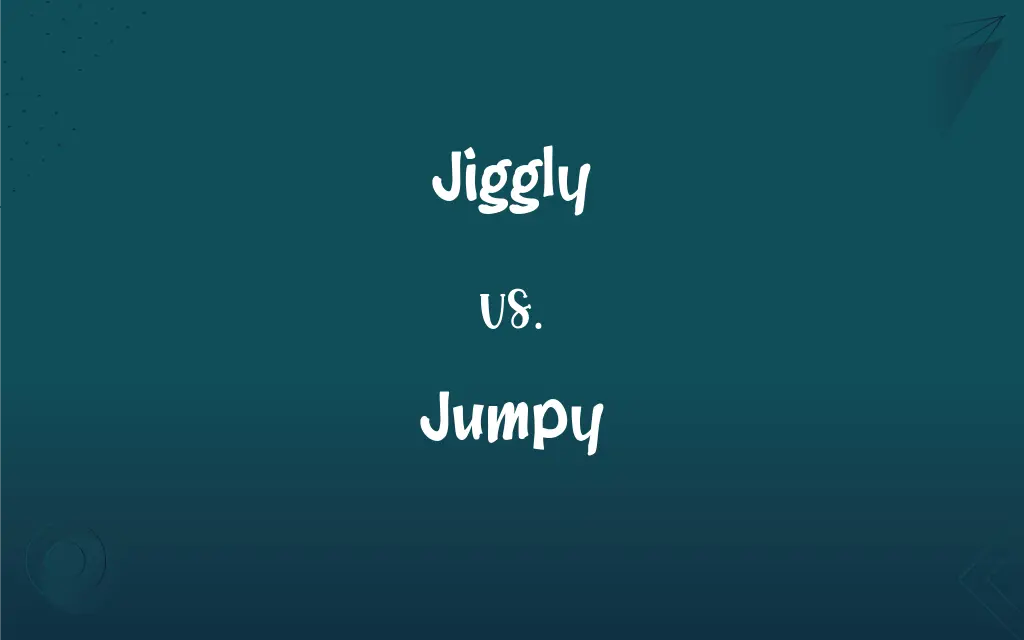Jiggly vs. Jumpy: What's the Difference?
Edited by Aimie Carlson || By Janet White || Published on January 26, 2024
Jiggly refers to a soft, wobbly movement or consistency, while jumpy denotes a sudden, startled movement or nervousness.

Key Differences
Jiggly often describes a physical state characterized by a gentle, often pleasing, wobble, often associated with objects that are soft and flexible. Jumpy, in contrast, implies a sudden and quick movement, usually as a reaction to surprise or nervousness. These terms paint different pictures: one of soft, fluid motion, the other of abrupt, reactive movement.
In describing texture or consistency, jiggly is apt for things like gelatin or a soft mattress, indicating a playful and light movement. Jumpy, however, is used to describe a person's behavior, suggesting a state of restlessness or being easily startled, often reflecting a psychological state rather than a physical quality.
When used metaphorically, jiggly can describe a situation or a concept that is not firmly set or decisive, implying a lack of solidity. Jumpy, on the other hand, metaphorically refers to a person's mental state, indicating edginess or a lack of tranquility, often in anticipation of something unexpected.
In terms of human behavior, a jiggly person might be seen as relaxed and carefree, their movements easy and unhurried. A jumpy person, conversely, is perceived as tense and alert, perhaps due to anxiety or fear, showcasing a stark contrast in demeanor.
Jiggly captures a sense of soft, easy movement or flexibility, often with a playful or unstructured quality. Jumpy, in contrast, conveys a sense of sudden, sharp movement or a state of alertness, often tied to nervousness or fear.
ADVERTISEMENT
Comparison Chart
Physical Description
Soft, wobbly, and flexible
Sudden, quick, and startled movements
Emotional Connotation
Relaxed, playful, carefree
Nervous, tense, edgy
Usage Context
Physical objects, textures
Behavioral traits, psychological state
Metaphorical Use
Lack of firmness or decisiveness
Mental alertness or anticipation
Human Behavior
Unhurried, gentle movement
Tense, alert, reactive
ADVERTISEMENT
Jiggly and Jumpy Definitions
Jiggly
Exhibiting a soft, wobbly motion.
The dessert was jiggly and fun to poke.
Jumpy
Easily startled or nervous.
The loud noise made her feel jumpy.
Jiggly
Lacking firmness; easily shaken.
The old bridge felt jiggly as we crossed it.
Jumpy
Characterized by sudden, quick movements.
His jumpy reflexes were perfect for the game.
Jiggly
Characterized by light, bouncy movements.
The puppy's jiggly walk made everyone smile.
Jumpy
Reacting quickly to stimuli or surprises.
The jumpy cat leaped at every shadow.
Jiggly
Not rigid or tightly fixed in place.
The loose screws made the shelf jiggly.
Jumpy
Marked by spasmodic movements.
The jumpy video made it hard to focus.
Jiggly
Vibrating gently; quivering.
The gelatinous mold was jiggly when moved.
Jumpy
Restlessly anxious or uneasy.
Waiting for the results made him jumpy.
Jiggly
To move or rock lightly up and down or to and fro in an unsteady, jerky manner
The gelatin jiggled on the plate.
Jumpy
Characterized by fitful, jerky movements.
Jiggly
To cause to jiggle.
Jumpy
On edge; nervous.
Jiggly
A jiggling motion.
Jumpy
Nervous and excited.
Jiggly
That jiggles
Jumpy
Tending to jump; full of jumps.
Jumpy
Jumping, or inducing to jump; characterized by jumps;
Jumpy
Being in a tense state
FAQs
Can people be described as jiggly?
Yes, often in a playful sense relating to movement or body.
Can jiggly be used to describe liquids?
Yes, if they have a thick, semi-solid consistency.
What does jiggly mean?
Jiggly refers to a soft, wobbly movement or consistency.
Is jiggly used in a technical context?
Rarely, it's more common in informal language.
Can animals be jumpy?
Yes, especially when startled or nervous.
Is jiggly a negative description?
Not necessarily; it can be neutral or playful depending on context.
What does jumpy mean?
Jumpy describes sudden, startled movement or nervousness.
Is being jumpy considered a positive trait?
Usually not, as it implies nervousness or anxiety.
What are common situations to use jumpy?
Describing someone's anxious or nervous behavior.
Is jiggly a scientific term?
No, it's colloquial and informal.
Do jiggly and jumpy have similar meanings?
No, they describe different kinds of movement or states.
Can jiggly be used in a culinary context?
Yes, to describe the texture of certain foods.
Can jumpy refer to physical objects?
Generally, no. It's more about behavior or feelings.
Is jumpy a medical term?
No, it's more colloquial and describes behavior.
Can jiggly be used metaphorically?
Yes, to imply something is not firm or decisive.
Can jumpy be a permanent trait?
It's usually situational, but can be a trait in some people.
Does jiggly have synonyms?
Yes, like wobbly, bouncy, or squishy.
Is jumpy always related to fear?
Often, but it can also be due to excitement or anticipation.
How can I use jiggly in a sentence?
"The pudding was delightfully jiggly."
How can I use jumpy in a sentence?
"He was jumpy after watching the thriller movie."
About Author
Written by
Janet WhiteJanet White has been an esteemed writer and blogger for Difference Wiki. Holding a Master's degree in Science and Medical Journalism from the prestigious Boston University, she has consistently demonstrated her expertise and passion for her field. When she's not immersed in her work, Janet relishes her time exercising, delving into a good book, and cherishing moments with friends and family.
Edited by
Aimie CarlsonAimie Carlson, holding a master's degree in English literature, is a fervent English language enthusiast. She lends her writing talents to Difference Wiki, a prominent website that specializes in comparisons, offering readers insightful analyses that both captivate and inform.
































































